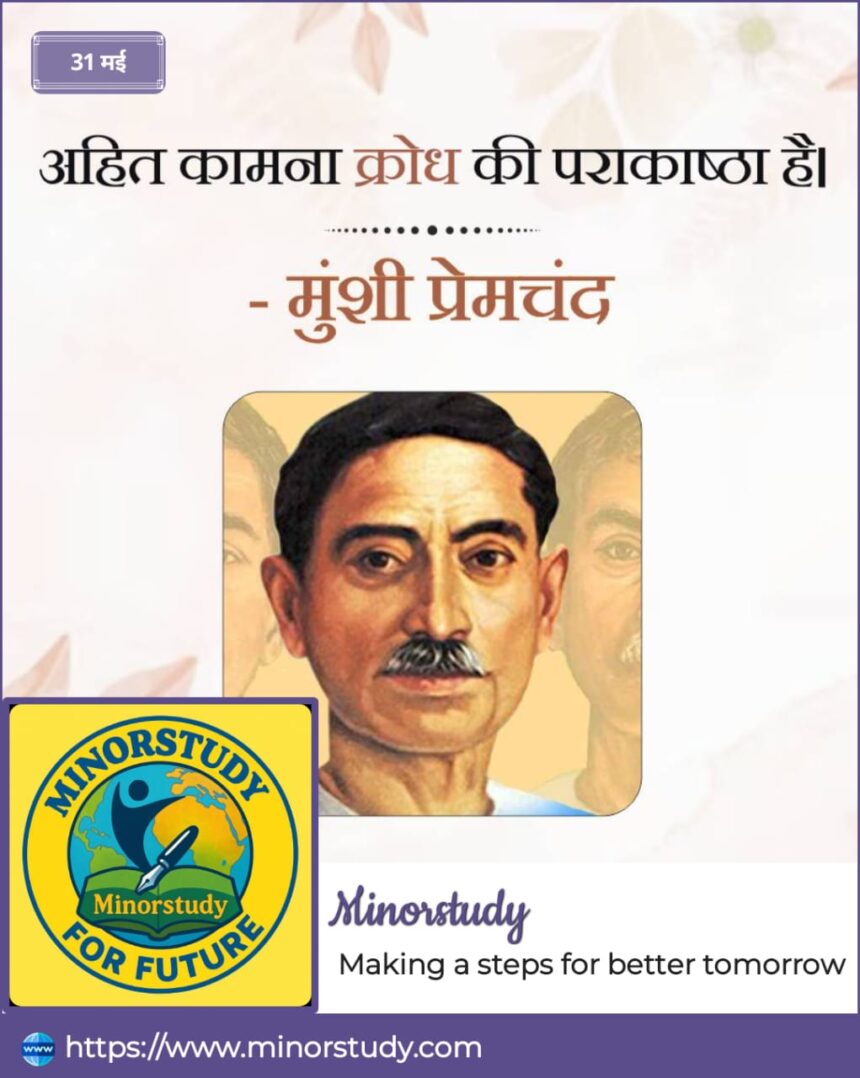Introduction: The Timeless Voice of Indian Society – Munshi Premchand
Munshi Premchand is not just a name in Indian literature; he is the soul of common people, a mirror of society, and a visionary voice of India’s freedom movement through his pen. Born at a time when India was struggling with colonialism, poverty, social evils, and feudalism, Premchand used literature to wake up a sleeping society and infuse it with empathy, justice, and realism.
- Introduction: The Timeless Voice of Indian Society – Munshi Premchand
- History of Munshi Premchand: The Man Behind the Pen
- Major Works of Munshi Premchand
- 15 Incredible Facts About Munshi Premchand
- Timeline of Munshi Premchand’s Life
- Significance of Munshi Premchand in Indian Literature
- FAQs About Munshi Premchand
- Wishing on Munshi Premchand Jayanti (July 31)
- Impact on Daily Life and Society
- Why Is Munshi Premchand Still Important Today?
- Conclusion: The Legacy That Lives On
- Important Points to Remember
If you’ve ever read “Godaan” or “Kafan”, you know that Premchand doesn’t just tell stories—he shakes you to the core. Through this article, let’s explore who Munshi Premchand really was, his contribution to Indian society, his life, works, legacy, and why we still need him in today’s times.
History of Munshi Premchand: The Man Behind the Pen
Real Name: Dhanpat Rai Srivastava
Pen Name: Nawab Rai (initially), later Munshi Premchand
Date of Birth: July 31, 1880
Place: Lamhi Village, near Varanasi, Uttar Pradesh
Died: October 8, 1936, at age 56
Premchand was born into a Kayastha family, which was well-versed in Persian and Urdu. His early life was filled with hardships. He lost his mother at the age of 7 and his father at 14. Struggling with poverty, he began working as a tutor to support himself while pursuing his studies.
He started his career writing in Urdu under the pen name “Nawab Rai” and gradually moved towards Hindi, becoming a bridge between these two rich literary traditions.
Major Works of Munshi Premchand
Here are some of his most iconic works in both Hindi and Urdu:
| Title | Year | Genre | Theme |
|---|---|---|---|
| Godaan | 1936 | Novel | Poverty, exploitation |
| Gaban | 1931 | Novel | Greed, morality, middle-class |
| Kafan | 1936 | Short Story | Death, poverty, social irony |
| Nirmala | 1927 | Novel | Dowry, child marriage |
| Sevasadan | 1918 | Novel | Women’s rights, social reform |
| Mansarovar (Vol I-VIII) | 1900s-30s | Short Stories | Various—justice, morality, love |
15 Incredible Facts About Munshi Premchand
He was called the ‘Upanyas Samrat’, meaning Emperor of Novels.
Initially wrote in Urdu before switching to Hindi, uniting North Indian literature.
Was a freedom supporter who wrote against British rule.
Worked as a teacher and later a deputy sub-inspector of schools.
Burned his early works at the advice of British officials to avoid arrest.
His novel “Godaan” was unfinished at the time of his death but remains his magnum opus.
He translated Tolstoy’s works into Hindi.
His wife Shivrani Devi wrote a biography titled “Premchand Ghar Mein”.
Tackled taboo topics like child marriage, widow remarriage, and prostitution in his novels.
Inspired later filmmakers like Satyajit Ray, Bimal Roy, and Shyam Benegal.
His stories are part of NCERT & CBSE curriculum even today.
He ran his own printing press – Saraswati Press.
Founded Hans, a literary magazine that still publishes progressive writing.
His writings were deeply influenced by Gandhi’s ideologies.
He never shied away from portraying harsh realities, making him timeless.
Timeline of Munshi Premchand’s Life
| Year | Event |
|---|---|
| 1880 | Born in Lamhi, Varanasi |
| 1898 | Published first short novel “Asrar e Ma’abid” |
| 1910 | Government confiscated his book “Soz-e-Watan” |
| 1919 | Resigned from government service to focus on writing |
| 1930s | Founded “Hans” and “Jagaran” magazines |
| 1936 | Died, leaving behind Godaan as his final masterpiece |
Significance of Munshi Premchand in Indian Literature
Premchand is not just a storyteller, but a chronicler of social realism. He introduced India to the power of fiction that could change minds. His stories depicted:
Rural poverty and urban chaos
Colonial oppression
Women’s rights
Caste injustice
Moral dilemmas and inner conflicts
He didn’t sugarcoat his characters—they were flawed yet human, poor yet strong. He wrote about life as it is, not as it should be.
FAQs About Munshi Premchand
Q1. Why is Premchand called the father of modern Hindi literature?
Because he introduced realism, nationalism, and moral complexity in Hindi prose.
Q2. What is his most famous novel?
“Godaan” is considered his masterpiece.
Q3. Was Premchand also involved in the freedom movement?
Yes, indirectly. His writings were anti-British and promoted Swadeshi values.
Q4. Did he write in English?
No, but his works have been widely translated into English and other Indian languages.
Q5. Are his stories relevant today?
Absolutely. Themes of inequality, corruption, and human dignity are still pertinent.
Wishing on Munshi Premchand Jayanti (July 31)
Every year, Premchand Jayanti is celebrated across India to honor his birth anniversary.
Wishing Ideas:
“Remembering the pen that spoke louder than swords – Happy Munshi Premchand Jayanti.”
“On this day, let’s pick up a book, not a phone. Read Premchand, feel India.”
“Tributes to the voice of the voiceless – Munshi Premchand.”
Impact on Daily Life and Society
School Textbooks: His stories like Idgah and Poos Ki Raat are part of moral education.
Films and TV: Several adaptations have brought his works to new generations.
Empathy Training: His characters teach us to understand others’ struggles.
Language Development: He modernized Hindi and Urdu prose style.
Value System: Encouraged simplicity, honesty, and social justice.
Why Is Munshi Premchand Still Important Today?
In a world dominated by instant gratification, Munshi Premchand teaches us:
To observe society deeply
To speak truth even when it’s unpopular
To feel for the underdog
To be responsible citizens
He inspires writers, activists, and thinkers even 80+ years after his death.
Conclusion: The Legacy That Lives On
Munshi Premchand may have left this world in 1936, but his words are alive in every corner of Indian consciousness. His literature is not entertainment—it’s a wake-up call to the conscience of humanity.
He’s not just a writer of the past. He is the voice of the present and the guide for the future. In every classroom, in every village, in every person seeking justice—Premchand lives on.
Important Points to Remember
Munshi Premchand is India’s most influential Hindi-Urdu writer.
His works reflect poverty, injustice, and humanity.
Still taught in schools and adapted into films.
Symbolizes literature with a conscience.
Celebrated every year on July 31st.









Admiring the hard work you put into your website and in depth information you provide.
It’s good to come across a blog every once in a while that isn’t the same unwanted rehashed
material. Great read! I’ve saved your site and I’m including your RSS feeds to my
Google account.
Good write-up. I certainly appreciate this website. Thanks!
Hello! I know this is somewhat off topic but I was wondering which blog platform are you
using for this website? I’m getting fed up of WordPress because I’ve had problems
with hackers and I’m looking at options for another platform.
I would be fantastic if you could point me in the direction of a good platform.
Visit my homepage … Magnetic Earrings Weight Loss
I love reading an article that can make men and women think.
Also, thank you for allowing for me to comment!